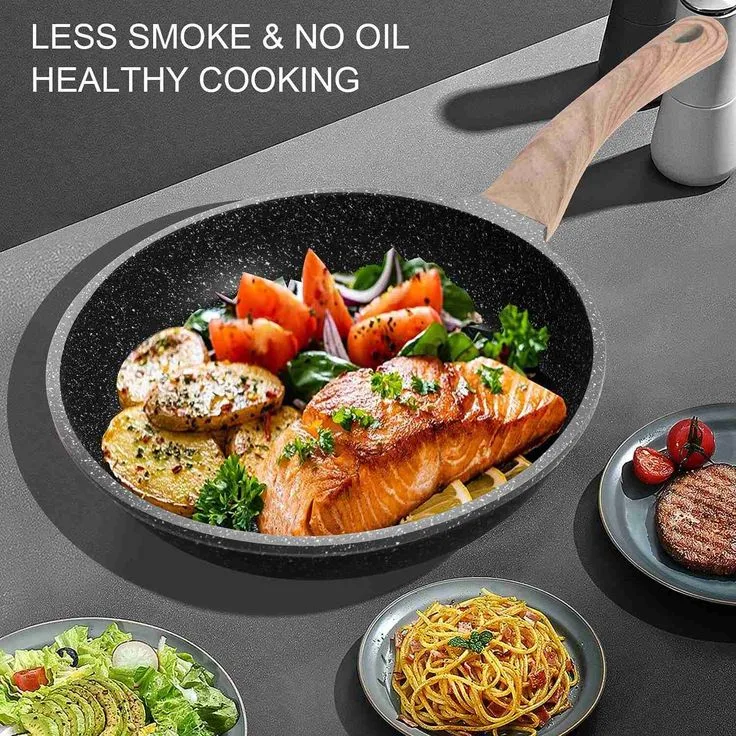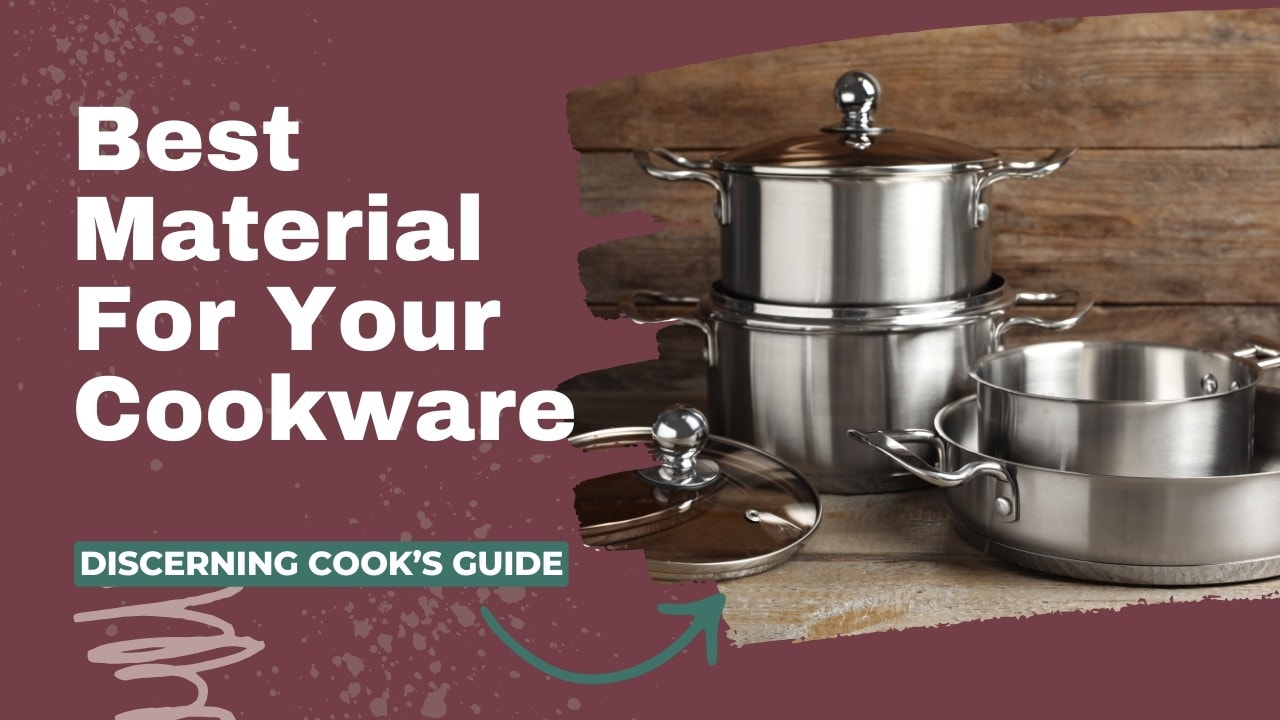Physical Address
304 North Cardinal St.
Dorchester Center, MA 02124

Stone cookware offers excellent heat retention and a chemical-free non-stick surface, but it can be heavy and may require careful handling to avoid chipping. Stone cookware blends durability with a natural cooking approach, appealing to health-conscious and gourmet cooks alike.
Choosing the right kitchen tools can elevate your cooking game. Stone cookware, with its superb durability, conducts heat evenly, making it ideal for a variety of dishes. Its non-reactive surface ensures that flavors remain unaltered, and the absence of synthetic coatings like Teflon provides a safer cooking experience.
The thermal mass of stone retains heat, keeping food warm long after it’s been removed from the stove. Yet, its heaviness might strain your wrists, and while it resists scratches, it’s not immune to chipping or breaking if dropped. Care and maintenance are paramount; seasoning on the surface prevents food from sticking and extends the cookware’s life. This cookware caters to those who prioritize healthy cooking and are ready to invest a bit more effort for quality results in the kitchen.
Read More: Air Fryer Vs Oven: The Ultimate Battle for Deliciously Crispy and Healthy Cooking
:max_bytes(150000):strip_icc()/__opt__aboutcom__coeus__resources__content_migration__serious_eats__seriouseats.com__2018__12__20181116-copper-pot-making-vicky-wasik-18-ee43034ff3634c8e834f58387fd9c330.jpg)
Credit: www.seriouseats.com
Unearthing the Popularity of Stone Cookware shines a light on modern kitchens worldwide. More cooks turn to stone-based utensils. Unique benefits and stylish looks drive this popularity.
Kitchen trends evolve constantly. Stone cookware has emerged as a preferred choice for many. Its non-stick properties make it convenient. Cooking with stone cookware means less oil and healthier meals. Here’s why it stands out:
The old-school vibe of stone materials catches the eye. People love the natural aesthetic. Stone cookware brings a rustic touch to modern homes. The blend of retro charm and contemporary performance has broad appeal. Look at these features:
Exploring the kitchen wonders, stone cookware stands out for many chefs. Stone cookware brings a blend of traditional cooking and modern innovation to the kitchen. Chefs admire the remarkable qualities of stone cookware. These pots and pans offer natural, healthy cooking options. Let’s dive into the reasons chefs are smitten by stone cookware.
Stone cookware boats natural non-stick surfaces. This quality makes cooking and cleaning a breeze. You won’t need much oil, making meals healthier. Eggs slide right off, pancakes flip effortlessly, and the sauce doesn’t stick. This non-stick surface isn’t by chemical coatings. It’s friendly for daily cooking and the environment too.
Ever wanted perfectly cooked meals? Stone pots and pans excel here. They retain heat like no other. You’ll get even temperatures throughout. This means steaks brown perfectly, veggies cook uniformly, and cakes rise equally. Chefs love the consistent results stone cookware delivers. It’s ideal for slow simmering and searing alike.
Expect stone cookware to last years. It’s tough against scratches and daily wear. Drop it, use metal utensils, or scrub hard—stone cookware can take it. There’s no need for frequent replacements. This longevity is a cost-effective benefit. It makes stone cookware an enduring piece in a chef’s culinary arsenal.
Exploring the realm of culinary considerations, cooking with stone brings a traditional twist to modern kitchens. The tastes and aromas they inspire are reminiscent of age-old cooking practices. Let’s delve into what makes stone cookware a unique choice for chefs and home cooks alike.
Stone cookware is a champion of flexibility in meal preparation. Its ability to transfer from stovetop to oven makes it ideal for a variety of recipes. Witness stone cookware excels in:
Its heat retention qualities ensure that meals remain warm, offering both comfort and convenience.
Proper care for stone cookware is the key to its longevity. Simple steps to maintain its integrity include:
With these practices, stone cookware can last for years, making it a worthy investment.
Stone cookware is renowned for its ability to enhance flavors. Foods cooked on stone absorb the essence of the material, leading to:
| Food Type | Benefit |
|---|---|
| Pizza | Crispier crusts akin to wood-fired ovens |
| Meat | Rich, smoky accents not easily replicated |
| Bread | Even browning for an artisanal touch |
The stone’s natural properties bring out an authentic taste, making every meal memorable.

Credit: www.pinterest.com
Navigating the Drawbacks of Stone Cookware can be much like walking a tightrope. You want the natural, non-stick benefits, but you may stumble upon a few cons. Understanding these setbacks ensures you make the most of your kitchenware without any unwelcome surprises.
Stone cookware shines in durability and longevity. Yet, its hefty nature poses challenges:
Stone cookware isn’t keen on extreme heat. Issues to keep in mind include:
While generally safe, some stone cookware may harbor hidden risks:
When diving into the world of cookware, stone emerges as a coveted option. But how does it stack up against its kitchen counterparts? Let’s explore the battle of materials and assess the nitty-gritty of stone vis-a-vis other popular cookware. Buckle up for a cookware comparison that may just redefine your culinary arsenal.
Stone cookware brings a non-stick convenience, but cast iron and stainless steel are venerable veterans in the kitchen arena.
| Materials | Heat Retention | Reactivity | Maintenance |
|---|---|---|---|
| Stone | Good | Non-reactive | Easy |
| Cast Iron | Excellent | May react with acidic foods | Seasoning required |
| Stainless Steel | Varies | Non-reactive | Easy with proper care |
Teflon once reigned supreme for its non-stick prowess. Yet, health concerns arose due to its chemical component, PTFE, especially when overheated. Stone cookware offers a safer alternative, lacking these worrisome chemicals.
Stone cookware and ceramic share a kinship, both flaunting non-stick qualities without toxic coatings. However, they differ subtly.
Deciding on new cookware can be a challenge.
Stone cookware is gaining popularity.
Let’s dive into what makes it special and consider if it’s a fit for your kitchen.
Evaluate your cooking style before choosing stone cookware.
Consider the weight and care requirements too.
Stone cookware can be an investment.
| Cost | Value |
|---|---|
| Initial Price | Higher than metal cookware |
| Longevity | Often lasts longer |
Higher upfront costs but value over time could be worth it.
Stone cookware often boasts eco-friendly traits.
Many brands offer non-toxic, PFOA-free surfaces.
This means safer cooking and less environmental impact.
Read More: What Blender Should I Buy? Find Your Perfect Match Today!

Credit: theskillfulcook.com
Stone cookware is generally considered safe for cooking. It is often PFOA and PTFE-free, meaning it doesn’t release harmful chemicals when heated. Its natural non-stick surface reduces the need for excess oil, promoting healthier cooking habits.
Yes, most stone cookware can withstand high oven temperatures, often up to 450°F or higher. However, you should always check the manufacturer’s guidelines to ensure that your specific cookware item is oven-safe and understand any temperature limitations that might apply.
With proper care, stone cookware can last several years, often outliving traditional non-stick pans. Its durability is one of its key advantages, resisting scratches and wear. Avoiding metal utensils and harsh cleaning tools will extend its lifespan.
Stone cookware offers excellent heat distribution and retention, natural non-stick properties, and is typically free from harmful chemicals. It is also durable and often suitable for various cooking methods, including stovetop and oven use.
Selecting the right cookware is a blend of personal preference and practicality. Stone cookware offers a mix of durability and non-stick convenience, yet requires mindful care to maintain. It’s a viable option for health-conscious cooks valuing even heating. Weigh these pros and cons to make an informed choice for your culinary adventures.